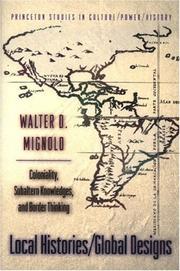| Listing 1 - 10 of 84 | << page >> |
Sort by
|
Book
ISBN: 9780822350606 9780822350781 0822350602 0822350785 0822394502 1283373092 9786613373090 Year: 2011 Publisher: Durham: Duke university press,
Abstract | Keywords | Export | Availability | Bookmark
 Loading...
Loading...Choose an application
- Reference Manager
- EndNote
- RefWorks (Direct export to RefWorks)
During the Renaissance and the Enlightenment, coloniality emerged as a new structure of power as Europeans colonized the Americas and built on the ideas of Western civilization and modernity as the endpoints of historical time and Europe as the center of the world. Walter D. Mignolo argues that coloniality is the darker side of Western modernity, a complex matrix of power that has been created and controlled by Western men and institutions from the Renaissance, when it was driven by Christian theology, through the late twentieth century and the dictates of neoliberalism. This cycle of coloniality is coming to an end. Two main forces are challenging Western leadership in the early twenty-first century. One of these, “dewesternization,” is an irreversible shift to the East in struggles over knowledge, economics, and politics. The second force is “decoloniality.” Mignolo explains that decoloniality requires delinking from the colonial matrix of power underlying Western modernity to imagine and build global futures in which human beings and the natural world are no longer exploited in the relentless quest for wealth accumulation.
Civilisation --- Colonisation. Decolonisation --- Civilization, Western. --- Civilization, Modern. --- Decolonization. --- Forecasting. --- #SBIB:39A74 --- #SBIB:39A3 --- 316.323.82 --- Forecasts --- Futurology --- Prediction --- Sovereignty --- Autonomy and independence movements --- Colonization --- Postcolonialism --- Modern civilization --- Modernity --- Civilization --- Renaissance --- Civilization, Occidental --- Occidental civilization --- Western civilization --- Etnografie: Amerika --- Antropologie: geschiedenis, theorie, wetenschap (incl. grondleggers van de antropologie als wetenschap) --- Kolonialisme. Sociologie van kolonialisme. Sociologie van ontwikkelingslanden --- History --- 316.323.82 Kolonialisme. Sociologie van kolonialisme. Sociologie van ontwikkelingslanden --- Civilization, Western --- Civilization, Modern --- Decolonization --- Forecasting --- Civilisation occidentale --- Décolonisation

ISBN: 0691001405 0691001391 9780691001395 9780691001401 Year: 2000 Publisher: Princeton: Princeton university press,
Abstract | Keywords | Export | Availability | Bookmark
 Loading...
Loading...Choose an application
- Reference Manager
- EndNote
- RefWorks (Direct export to RefWorks)
Colonisation. Decolonisation --- Theory of knowledge --- Sociology of culture --- Colonies --- Postcolonialism --- Culture --- Knowledge, Theory of --- Hermeneutics --- Political aspects --- Colonies. --- Postcolonialism. --- Culture. --- Hermeneutics. --- Political aspects. --- Post-colonialism --- Postcolonial theory --- Political science --- Decolonization --- Epistemology --- Philosophy --- Psychology --- Interpretation, Methodology of --- Criticism --- Cultural sociology --- Civilization --- Popular culture --- Anti-colonialism --- Colonial affairs --- Colonialism --- Neocolonialism --- Imperialism --- Non-self-governing territories --- Colonization --- Social aspects --- Knowledge, Theory of - Political aspects
Book
ISBN: 9781405100861 1405100869 9781405100854 1405100850 Year: 2006 Publisher: Malden, MA: Blackwell,
Abstract | Keywords | Export | Availability | Bookmark
 Loading...
Loading...Choose an application
- Reference Manager
- EndNote
- RefWorks (Direct export to RefWorks)
#SBIB:39A74 --- #SBIB:98G --- Etnografie: Amerika --- Geschiedenis van Latijns-Amerika --- Name --- Nom --- Influence européenne --- Latin America --- Asociación Latinoamericana de Libre Comercio countries --- Neotropical region --- Neotropics --- New World tropics --- Spanish America --- Europe --- Civilization --- European influences. --- Colonization. --- History --- Philosophy. --- Name. --- Race relations. --- Sociology of minorities --- Sociology of culture --- Philosophy --- European influences --- Race relations --- Colonization --- Amérique latine --- Histoire --- Philosophie --- Civilisation --- Influence européenne --- Relations raciales --- Colonisation --- Latin America - Name --- Latin America - History - Philosophy --- Latin America - Civilization - European influences --- Latin America - Race relations --- Latin America - Colonization
Book
ISBN: 128357148X 9786613883933 1400845068 9781400845064 9781283571487 9780691156095 0691156093 Year: 2012 Publisher: Princeton, NJ : Princeton University Press,
Abstract | Keywords | Export | Availability | Bookmark
 Loading...
Loading...Choose an application
- Reference Manager
- EndNote
- RefWorks (Direct export to RefWorks)
Local Histories/Global Designs is an extended argument about the "coloniality" of power by one of the most innovative Latin American and Latino scholars. In a shrinking world where sharp dichotomies, such as East/West and developing/developed, blur and shift, Walter Mignolo points to the inadequacy of current practices in the social sciences and area studies. He explores the crucial notion of "colonial difference" in the study of the modern colonial world and traces the emergence of an epistemic shift, which he calls "border thinking." Further, he expands the horizons of those debates already under way in postcolonial studies of Asia and Africa by dwelling in the genealogy of thoughts of South/Central America, the Caribbean, and Latino/as in the United States. His concept of "border gnosis," or sensing and knowing by dwelling in imperial/colonial borderlands, counters the tendency of occidentalist perspectives to manage, and thus limit, understanding. In a new preface that discusses Local Histories/Global Designs as a dialogue with Hegel's Philosophy of History, Mignolo connects his argument with the unfolding of history in the first decade of the twenty-first century.
Postcolonialism. --- Knowledge, Theory of --- Hermeneutics. --- Culture. --- Colonies. --- Interpretation, Methodology of --- Criticism --- Epistemology --- Theory of knowledge --- Philosophy --- Psychology --- Cultural sociology --- Culture --- Sociology of culture --- Civilization --- Popular culture --- Post-colonialism --- Postcolonial theory --- Political science --- Decolonization --- Anti-colonialism --- Colonial affairs --- Colonialism --- Neocolonialism --- Imperialism --- Non-self-governing territories --- Colonization --- Political aspects. --- Social aspects --- Caribbean. --- Central America. --- Crolization. --- Eurocentrism. --- Florencia Mallon. --- Haitian Revolution. --- Latin America. --- Latin American Subaltern Studies Group. --- Maghreb. --- Occidentalism. --- Orientalism. --- South America. --- South Asian subaltern studies. --- anthropologians. --- anthropologists. --- area studies. --- border thinking. --- civilization borders. --- civilizing process. --- coevalness. --- colonial India. --- colonial borderland. --- colonial difference. --- colonial epistemic difference. --- colonial histories. --- community formation. --- cultural production. --- cultural revolutions. --- culture. --- deconstruction. --- disarticulations. --- epistemic colonial difference. --- geohistorical locations. --- geopolitical configurations. --- geopolitical values. --- geopolitics. --- global designs. --- hegemonic knowledges. --- hierarchical structures. --- identification. --- imperial borderland. --- imperial conflicts. --- knowledge production. --- language. --- languages. --- literature. --- literatures. --- migrations. --- modern colonial world. --- modern world system. --- modernity. --- nation borders. --- national ideologies. --- national languages. --- new world order. --- other thinking. --- other tongue. --- planetary civilization. --- post-Occidentalism. --- postcolonial Africa. --- postcolonial Asia. --- postcoloniality. --- postmodernism. --- postpartition India. --- power. --- racial configurations. --- social sciences. --- subaltern knowledges. --- technoglobalism. --- transmodernity. --- world system analysis.
Book
ISBN: 9781478001140 9781478002574 9781478001492 1478001496 Year: 2021 Publisher: Durham (N.C.): Duke University press,
Abstract | Keywords | Export | Availability | Bookmark
 Loading...
Loading...Choose an application
- Reference Manager
- EndNote
- RefWorks (Direct export to RefWorks)
In The Politics of Decolonial Investigations Walter D. Mignolo provides a sweeping examination of how coloniality has operated around the world in its myriad forms from the sixteenth century to the twenty-first. Decolonial border thinking allows Mignolo to outline how the combination of the self-fashioned narratives of Western civilization and the hegemony of Eurocentric thought served to eradicate all knowledges in non-European languages and praxes of living and being. Mignolo also traces the geopolitical origins of racialized and gendered classifications, modernity, globalization, and cosmopolitanism, placing them all within the framework of coloniality. Drawing on the work of theorists and decolonial practitioners from the Global South and the Global East, Mignolo shows how coloniality has provoked the emergence of decolonial politics initiated by delinking from all forms of Western knowledge and subjectivities. The urgent task, Mignolo stresses, is the epistemic reconstitution of categories of thought and praxes of living destituted in the very process of building Western civilization and the idea of modernity. The overcoming of the long-lasting hegemony of the West and its distorted legacies is already underway in all areas of human existence. Mignolo underscores the relevance of the politics of decolonial investigations, in and outside the academy, to liberate ourselves from canonized knowledge, ways of knowing, and praxes of living.
Colonisation. Decolonisation --- Civilization, Modern. --- Civilization, Western. --- Decolonization. --- Knowledge, Theory of --- Postcolonialism. --- Racism --- Political aspects.
Book
ISBN: 968837458X Year: 1986 Publisher: México, D.F. Universidad Nacional Autónoma de México
Abstract | Keywords | Export | Availability | Bookmark
 Loading...
Loading...Choose an application
- Reference Manager
- EndNote
- RefWorks (Direct export to RefWorks)
Multi
ISBN: 9781478001140 9781478002574 9781478001492 Year: 2021 Publisher: Durham, N.C. Duke University Press
Abstract | Keywords | Export | Availability | Bookmark
 Loading...
Loading...Choose an application
- Reference Manager
- EndNote
- RefWorks (Direct export to RefWorks)
"Walter D. Mignolo provides a sweeping examination of how coloniality has operated around the world in its myriad forms between the sixteenth and twenty-first centuries while calling for a decolonial politics that would delink from all forms of Western knowledge"--
Colonisation. Decolonisation --- Civilization, Modern. --- Civilization, Western. --- Decolonization. --- Knowledge, Theory of --- Postcolonialism. --- Racism --- Political aspects.
Book
ISBN: 8471334518 Year: 1983 Publisher: Madrid
Abstract | Keywords | Export | Availability | Bookmark
 Loading...
Loading...Choose an application
- Reference Manager
- EndNote
- RefWorks (Direct export to RefWorks)
Thematology --- Spanish-American literature --- anno 1900-1999

ISBN: 8474230594 Year: 1978 Publisher: Barcelona : Editorial Crítica,
Abstract | Keywords | Export | Availability | Bookmark
 Loading...
Loading...Choose an application
- Reference Manager
- EndNote
- RefWorks (Direct export to RefWorks)
Discourse analysis --- Literature --- Semiotics --- Analyse du discours --- Littérature --- Sémiotique --- Philosophy --- Philosophie
Book
ISBN: 1478001143 1478002573 1478001496 Year: 2021 Publisher: Durham : Duke University Press,
Abstract | Keywords | Export | Availability | Bookmark
 Loading...
Loading...Choose an application
- Reference Manager
- EndNote
- RefWorks (Direct export to RefWorks)
"Walter D. Mignolo provides a sweeping examination of how colonialty has operated around the world in its myriad forms between the sixteenth and twenty-first centuries while calling for a decolonial politics that would delink from all forms of Western knowledge."--
Decolonization. --- Postcolonialism. --- Racism --- Knowledge, Theory of --- Civilization, Western. --- Civilization, Modern. --- Political aspects.
| Listing 1 - 10 of 84 | << page >> |
Sort by
|

 Search
Search Feedback
Feedback About UniCat
About UniCat  Help
Help News
News